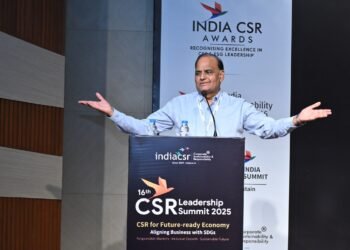Interview with Brotin Banerjee for India CSR Leadership Series with Nayan Mitra
India CSR News Network
NEW DELHI: As we speak to various national and international experts, we are very happy to bring to you the perceptions and opinions of one of the youngest Managing Directors of the TATA Group, Brotin Banerjee of Tata Housing Development Company Limited. With very low social indicators and the highest youth population in the world, India needs to empower its human resources and make them job ready for the world. Let us see what he has to say!
Tata Housing Development Company Limited (THDCL) have achieved quite a bit in CSR in a short period of time. How was this possible?
We as an organization share the overall value system established by the TATA Group. The primary purpose of doing business for the TATA Group has been to benefit all stakeholders including nation building and society at large. We have been very clear about strategic objectives of our various CSR initiatives. Most of our CSR programs are aligned to our Business. This approach has helped us to create an impact in society as well as ensured long term sustainability. We have a dedicated team working on this front. We have also made it a movement to work for the social cause in our company through the employees volunteering initiatives through which our employees contribute their valuable time and experience for the benefit of the society.
What, according to you, as a CSR leader, is the role of strategic management in CSR?
With the Companies Act on CSR being enacted, large amount of resources is and will be available for doing social good. Strategic management of the CSR programs are critical for the success of these programs. In my view, the CSR programs should be implemented in a project management mode with clear indicators for impact assessment at different project milestones and should be linked to the value chain of the companies to have long term sustainability.
Do you believe in the concept of Strategic CSR? Please do explain.
The CSR spending needs to be focused as precisely as possible. It should be well thought out having both social and business objectives rather than scattered or in piece meal. The CSR spending cannot be targeted only to create good will or brand value for the company. It has to bring positive tangible impact for both the society and the company. For example, let me share with you our efforts to improve the construction ecosystem through the skill development programs. After agriculture, construction ecosystem is the highest employment opportunity provider in India. Most of the people coming to work here are unskilled. This leads to poor productivity, quality and increase in indifferent wasted natural resources. We conduct skill development training for these workforce through NSDC affiliated organization. They undergo third party assessment and certification. Skilling this workforce improves their own earning as well as the construction ecosystem.
What is the role of industry clusters in developmental issues through CSR in an emerging economy?
As the human race is learning to utilize various resources to improve the quality of life, the inequitable growth and development is creating various social issues. The growth story also has its own impact on the environment and society. Global warming, climate change, inequitable distribution of wealth are some of the serious challenges created over last two hundred years. While it has become extremely important for the industry to reduce their negative impact on the society, it is also imperative to make conscious effort towards creating more equitable society. Our growth has to be inclusive and sustainable.
How has the CSR mandate under the Companies Act, 2013 affected THDCL?
The Companies Act has set a broad guideline for implementing various CSR initiatives. Our CSR budgetary allocation has always been more than what is mandated by the Companies Act. All our CSR initiatives are implemented in accordance with the Companies Act.
How do you envision CSR in India in ten years time?
We are a growing economy. I believe, in next ten years, the path will be set for rapid industrialization and urbanization. This urbanization will create its own social challenges including low cost housing, lack of water, healthcare & education. We have to allocate more resources to mitigate the impact of rapid urbanization and create opportunity for the people living in bottom of pyramid to reduce inequality.
What would be your priority areas of CSR intervention in India ten years from now?
India is going through its own phase of growth story. We already have and are going to have very large young population. The growth needs to have equitable distribution of wealth generated. There is a large section of the society who are still deprived. It’s important that they have the requisite skill to be part of this growth story in a meaningful way. Our focus will be on skill development and entrepreneurship development. Our effort will be to enable these young and deprived section of society to improve their earning and lead a better life.
About Brotin Banerjee
Brotin Banerjee joined TATA Housing Development Company Ltd (a 99.86% subsidiary of Tata Sons) as Deputy Chief Executive Officer in 2006 and was designated as the Managing Director (M.D) and Chief Executive Officer (CEO) of the company in 2008, thus giving him the distinction of being one of the youngest MDs across the TATA Group.
Banerjee has led Tata Housing’s journey from a loss making company to a profit making company that enjoys the unique position of having large in-city real estate properties in major metros and mini metros. As a comprehensive real estate developer of choice, Tata Housing now straddles across all consumer segments by offering products ranging from Rs. 15 lakh to Rs. 14 crore. It has a diversified portfolio of more than 70 million sq. under various stages of development and a steady pipeline of projects of over 19 million sq.
Under his leadership the company is consistently looking at re-inventing the business curve. Banerjee spearheads Tata Housing’s venture into environment friendly construction and has been constantly recognized for its eco-sensitive construction. The company recently received platinum certification from IGBC (Indian Green Building Council) for its ultra-luxury housing project Prive, Lonavala.
Banerjee has always believed in staying ahead of the curve and has been conferred with CEO of the year award by NDTV Profit and the CEO Magazine for his contribution towards the Real Estate Indus try. Very recently, Tata Housing bagged the prestigious Global Performance Excellence Award 2014 in the Services Category by Asia Pacific Quality Organization (APQO), Chicago, Illinois, USA, making it the only Indian real estate developer to win this prestigious award.
His penchant for setting higher benchmarks for the industry and experience, expertise and commitment in the field of Health Safety and Environment has earned him the prestigious seat as a board member with National Safety council of India to further strengthen the promotion of HSE at the national level. He was also elected as a Professional Member of The Royal Institution of Chartered Surveyors in 2011 and is also an active member of CII & FICCI’s real estate committees.
About Nayan Mitra
Nayan Mitra comes with a rich mix of diverse professional experience of over sixteen years. She straddles seamlessly between academics, social and corporate sectors. As a Developmental Consultant and Researcher, she works closely with some of the eminent Corporations and not-for profits of India as well as being in their Advisory and Board level. She has conducted several social researches for multi-lateral agencies; the findings of which have become important bases for sustainable action. She has been a resource person in eminent Institutions of higher learning in the areas of CSR and Corporate Governance and has important peer reviewed research publications to her credit in double blind peer reviewed national and international Academic journals and books as well as delivered at key Conferences. Her book, ‘Corporate Social Responsibility in India: Cases and Development after the Legal Mandate’ alongwith co-editor Dr. Rene Schmidpeter is a first book of its kind that charters the development of mandated Indian CSR from a multi-stakeholder perspective, bringing in over 15 authors. She spearheads the India CSR Leadership Series by India CSR. She was a finalist of the prestigious Chevening Gurukul Scholarship for Leadership and Excellence – 2013, as conferred by the Foreign and Commonwealth Office (FCO) of the British Deputy High Commission.






















